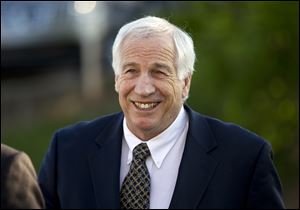
Sandusky case hearing resolves many issues
Defense seeks facts to challenge accusers
5/10/2012
Former Penn State football coach Jerry Sandusky is accused of sexual abuse of boys.
BELLEFONTE, Pa. -- A hearing expected by many to be contentious was anything but Wednesday as the judge presiding over the criminal case against former Penn State assistant football coach Jerry Sandusky deftly moved through issues ranging from privacy in school and psychological records to discovery requests and victim rights.
The hearing, called to allow several entities that received subpoenas from the defense to challenge those requests, lasted about 90 minutes.
By the end, nearly all of the outstanding issues had been resolved. For the few that remain, McKean County Senior Judge John M. Cleland said he would review any documents that may contain privileged information privately, in-chambers, and then make a determination if they should be turned over to the defense.
He said he would issue his decisions shortly.
Defense attorney Joe Amendola served a number of agencies and school districts with subpoenas in recent weeks seeking information about the 10 alleged victims in the sexual abuse case against Mr. Sandusky. Mr. Amendola has said he is seeking information that could be used to challenge the motives of the accusers, as well as to question their credibility.
Several school districts, offices of Child and Youth Services, and state agencies challenged the subpoenas, alleging that they sought privileged information, or were nothing more than a "fishing expedition."
At the outset of the hearing, Judge Cleland outlined his understanding of the law, telling the respective attorneys that subpoenas are to be used in a "search for the truth for the public good.
"There has to be a very good reason to interfere with the search for truth," he said.
Some of the entities raised "overbreadth" as an issue with the subpoenas. While Judge Cleland acknowledged that is a concern, he also said he understood why Mr. Amendola is seeking the records at hand.
"The defendant has made it quite clear the information being sought is to determine credibility," he said.
The judge gave the various parties until May 16 to comply with the subpoenas or face contempt charges.
"It is not my intention to be difficult," Judge Cleland said. "It is my intention to be practical. Trial, after all, is imminent."
Jury selection is scheduled to begin in Centre County on June 5. Again, Wednesday, Mr. Amendola filed a motion requesting a continuance of the trial date.
The judge has not yet addressed that request, but repeatedly eluded to the impending start date.
During the hearing, three area school districts that received subpoenas questioned whether an alleged victim's school attendance or kindergarten grades were really relevant to Mr. Sandusky's defense.
Mr. Amendola hedged on his answer.
"What we're looking for is if any of these students suffered any behavior issues or mental health issues prior to their involvement at Second Mile," he said.
"Do you care if they went to school every day in kindergarten?" Judge Cleland asked.
"Well, we don't," Mr. Amendola answered. "But we do want things that show behavior issues, bad grades, trouble in school."
Wednesday's hearing was also expected to include debate on a variety of outstanding discovery issues, however, the attorney general's office and Mr. Amendola apparently settled those ahead of time. The only remaining questions, he said, revolve around grand-jury information. The defense is seeking evidence presented to the grand jury, including information for people identified as Victims No. 11 through 17, for which Mr. Sandusky has not been charged.
At the conclusion of the hearing, attorney Stephanie Morris, who represents the National Center for Victims of Crime, asked to be heard. She had previously filed a motion seeking to file a friend-of-the-court brief on behalf of the alleged victims in the case in support of their privacy rights with regard to the subpoenas.
Judge Cleland denied the request, citing a practical and legal reason. As a practical matter, he said, friend-of-the-court briefs do not belong at the trial court level, and instead are used in appeals, where the issues are more clearly defined.
The Block News Alliance consists of The Blade and the Pittsburgh Post-Gazette. Paula Reed Ward is a reporter for the Post-Gazette.
Contact Paula Reed Ward at: pward@post-gazette.com or 412-263-2620.